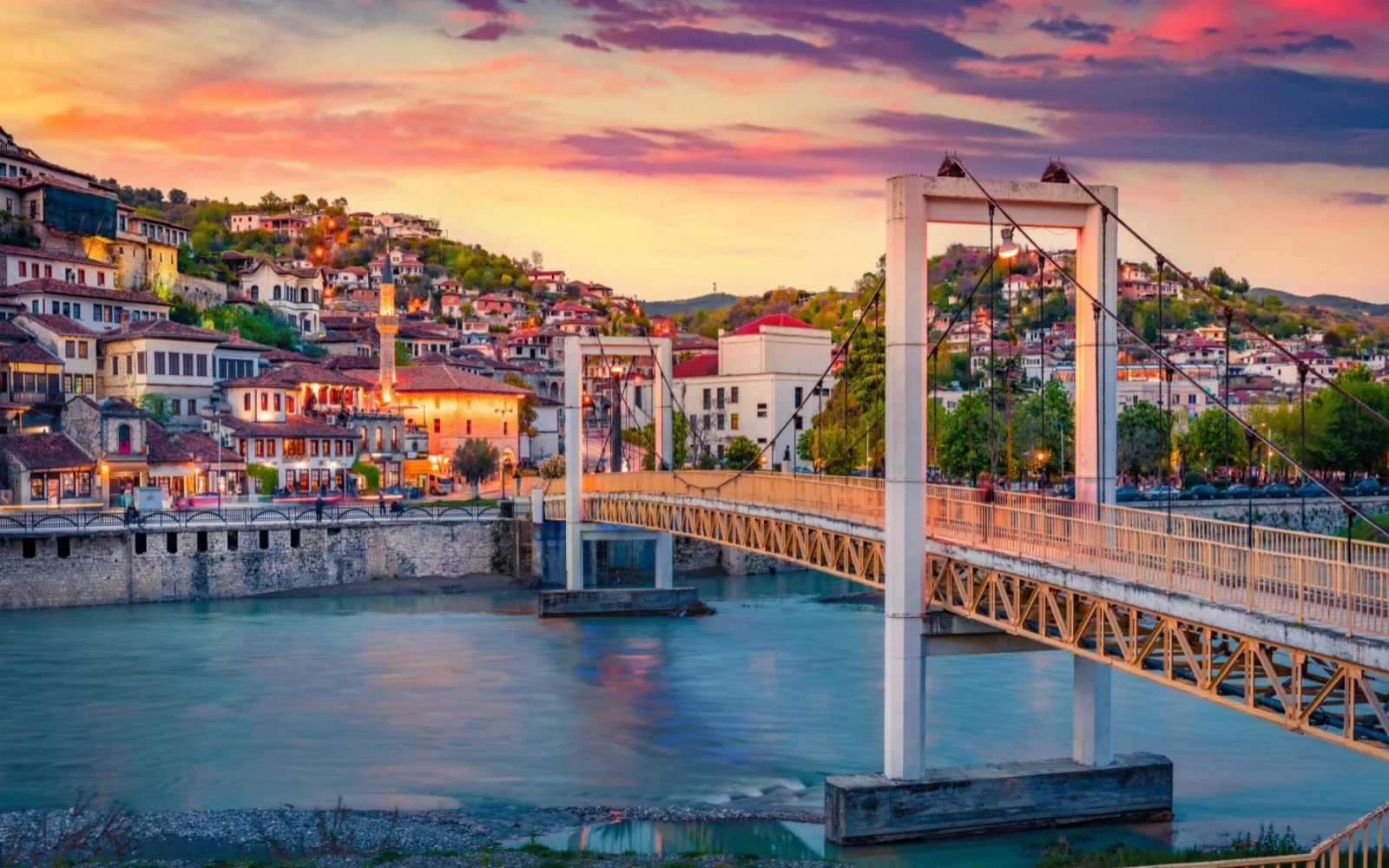The mysterious Balkan country of Albania, closed to foreigners for decades, is attracting more and more visitors. In 2022, 7.5 million foreign tourists came to the country.
The beautiful, affordable coastline on the Ionian and Adriatic Seas is Albania’s primary draw. Tourists flock to towns along the Albanian Riviera such as Dhermi and Saranda.
Be sure to check out Albania’s cities, such as bustling capital Tirana or UNESCO-protected Gjirokastra, which provides an insight into Albania’s unique Ottoman-inspired culture. Head inland and you’ll be rewarded with the stunning vistas of the Albanian Alps.
But while there’s plenty to see and do, is Albania safe to visit in 2024? Here’s our take.
Is Albania Safe to Visit in 2024?
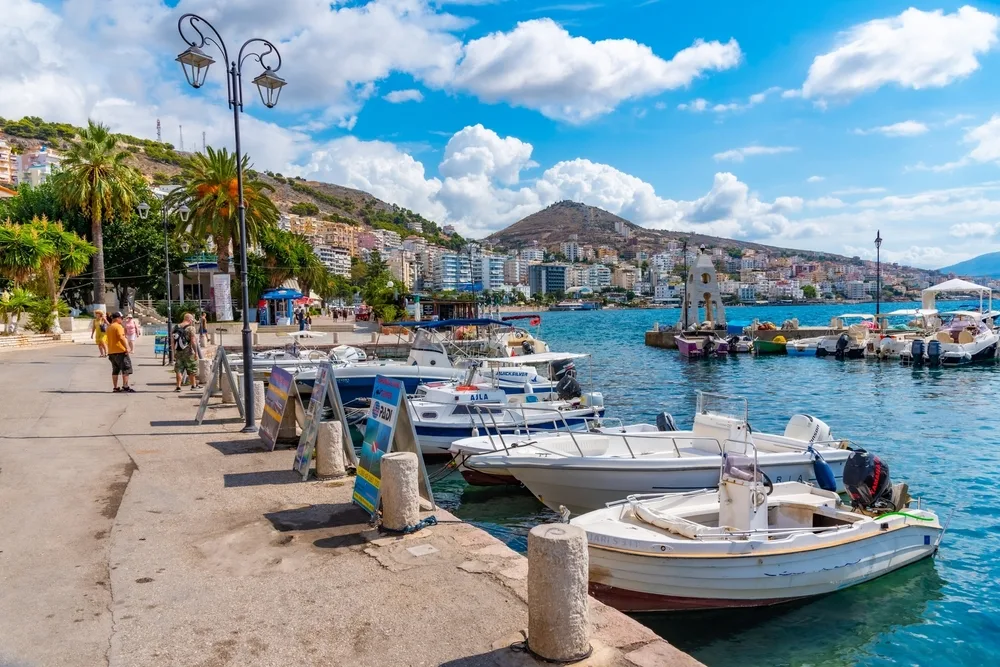
SARANDE, ALBANIA, SEPTEMBER 26, 2019: Boats mooring alongside seaside promenade at Sarande, Albania/Trabantos/Shutterstock
Yes. For the most part, Albania is a safe place to visit. You should be on your guard as crime does occur, especially petty theft. However, more violent incidents are rare.
A good place to start researching countries you know nothing about, including Albania, is foreign travel advisories. You can look at the advisory issued by your own government as well as other governments to give you more details.
The United States State Department has a Level Two travel advisory in place for Albania. It advises its citizens to exercise increased caution when visiting Albania due to higher levels of crime.
This warning is echoed by the New Zealand government. New Zealand also places Albania under a Level Two travel advisory, and also mentions the risk of crime.
Common crime incidents people experience in Albania include:
- Pickpocketing
- Bag snatching
- Scams
- Mugging
- Theft from vehicles
- Organized crime
It might be tempting to write Albania off as a crime-ridden destination, but the truth is actually far more complicated. For example, not all governments agree that you need to exercise caution when visiting Albania.
The Canadian government gives its citizens the green light for visiting Albania, explaining that you don’t need anything more than basic precautions.
Although violent crime occurs in the country, tourists are rarely involved. Pop culture and stereotypes also affect many people’s perceptions of Albania.
Many people know about the Albanian mafia, especially if they’ve watched the movie Taken, where the Albanian mafia are the main villains. Although Albania has a problem with organized crime, mafia groups are rarely interested in ordinary tourists.
Unlike in the movie, the mafia is more involved with local crimes such as drug trafficking and money laundering, not kidnapping foreigners. Civil unrest is not common in Albania, but it can happen.
In July 2022, there were massive protests in the capital Tirana against corruption in the government. Protests can still happen as not much has changed since and people are dissatisfied with the government of prime minister Edi Rama.
If you notice a protest happening, avoid crowds as they sometimes turn violent. Another thing to keep in mind is that the infrastructure in Albania may not be what you are used to.
The country is much poorer than most European countries, and important services such as law enforcement, healthcare, and public transportation are of poorer quality and sometimes nonexistent in remote areas. Make sure that you buy good travel insurance and prepare well for your trip.
Crime in Albania
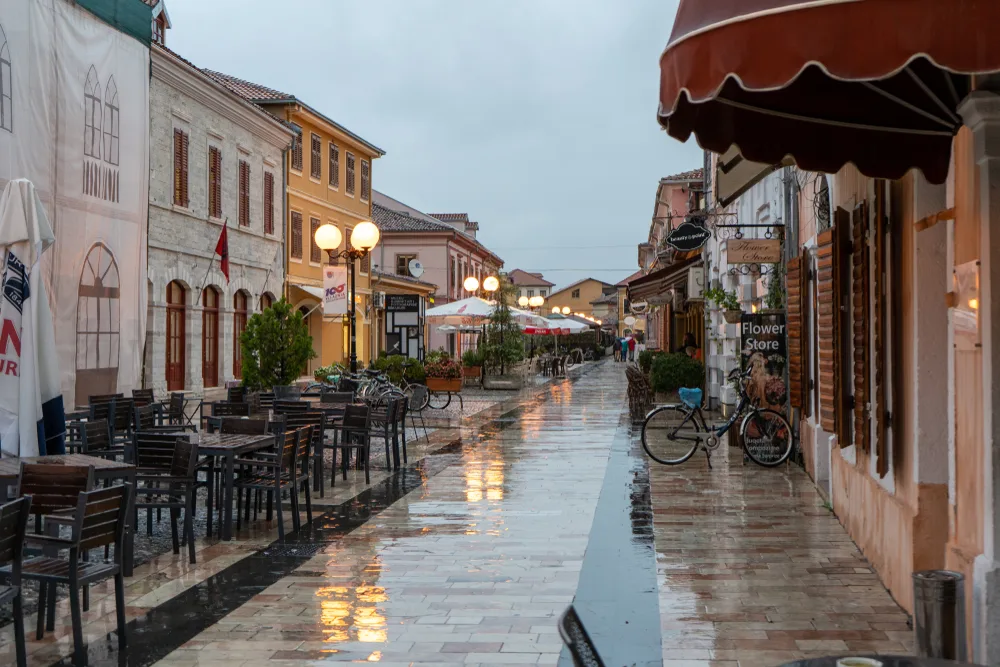
A Daily Odyssey/Shutterstock
Crime is one of the primary concerns for people visiting Albania. The stereotype of Albania is that it is a crime-ridden country. This stereotype is fueled by news of the far-reaching activities of the Albanian mafia as well as pop culture, such as the movie Taken.
It is true that Albania often struggles with crime. In 2021, local news calculated that crime occurred at a rate of 146 incidents per 100,000 people.
Crime rates are highest in big cities such as Tirana, Tropoja, Durres, and Vlora. According to official Albanian government statistics, crime rates are slowly increasing.
Some of the most common crimes are road traffic violations, which make up 16% of total crime incidents, theft, which makes up 12.1% of total crime incidents, and drug crimes, which make up 5.6% of total crime incidents.
The good news is that although people perceive Albania as a violent, crime-ridden country, violent crime makes up a small fraction of the overall crime rate.
Property crimes such as petty theft or minor infractions such as speeding are far more common, the same as they are in almost any other place in the world. The homicide rate in Albania is actually fairly low.
According to World Bank data, the homicide rate is only 2 incidents per 100,000 people. That is lower than the homicide rate in many Western countries, including the United States.
It is true that Albania has a serious problem with organized crime. According to the Organized Crime Index, Albania has the 9th worst organized crime problem in Europe.
The Albanian mafia is heavily involved in human trafficking, heroin, and cocaine trafficking throughout Europe. Mafia groups are heavily connected to the government and corrupt officials.
The Albanian mafia has an outsized presence in the country and throughout Europe. Many violent crime incidents in Albania are ultimately tied to mafia incidents.
However, the mafia is rarely interested in targeting civilians, especially not foreign civilians.
As long as you don’t get caught in the crossfire, you should be fine. A lot of factors contribute to the high crime rate in Albania. The country went through serious economic and social upheaval in the 1990s that it still hasn’t recovered from completely.
High corruption rates and high poverty rates also affect the crime rate. However, these societal problems mostly affect locals, not tourists. As long as you keep your wits about you, you should have a safe trip to the country.
Petty Theft
The most common crime you will encounter in Albania is petty theft. In its travel advisory for Albania, Australia mentions the risk of petty crime.
Pickpocketing is particularly common throughout the country as people take advantage of increasing crowds and tourism numbers. Popular tourist destinations such as markets, airports, hotel lobbies, and beaches are also popular targets.
Pickpockets are particularly common on public transportation such as shared taxis and public buses. Make sure that you put your valuables in a place where a pickpocket cannot easily reach, such as a money belt, zipped cross-body bag, or front pocket of your pants.
The Canadian government also offers tips in its travel advisory for Albania on how to manage petty theft. Avoid making yourself a target by showing signs of affluence — don’t wear expensive jewelry or flash lots of cash.
Be mindful of your surroundings and don’t wander into unfamiliar areas at night. Take precautions to make sure that if a theft does happen, it won’t be absolutely devastating.
Carry a photocopy of your passport around with you as ID instead of the actual document. Keep some cash and a backup credit card in a separate place so you always have a way to get home if something happens.
Vehicle break-ins are also a common form of petty theft in Albania. Renting a car is the best way to see more remote areas of the country as public transportation is not the best, but rental cars are often targeted by thieves.
Always make sure that you lock your doors and roll up your windows when you park. Choose parking locations carefully. Never leave any valuables in the car unattended and don’t leave any possessions visible in the car.
Scams are also common in Albania. Bars and nightclubs try to lure tourists in, then overcharge them for drinks. Trust your instincts and ask locals to tell you which bars to avoid.
Some are even associated with more intense crimes such as prostitution. Taxi drivers are also common scammers. They tend to wait around bus stations or popular tourist destinations for tourists they can overcharge.
Scamming drivers sometimes claim a bus or shared taxi will not arrive just so they can take you somewhere (for a higher fee, of course). Always double-check this kind of information. Only take authorized taxis and call them instead of hailing them from the street.
Organized Crime
Due to the prevalence of the Albanian mafia in popular consciousness, organized crime is a common concern for most people when coming to Albania. This concern is echoed in many travel advisories.
For example, the US government mentions that there has been “targeted violence” due to organized crime nationwide. The UK government elaborates on this danger with a bit more detail.
There have been cases of shoot-outs and small car bombs in Albania in the past. However, almost all instances of violence are targeted.
Mafia groups will conduct these operations to take out a rival head or fight over territory, and they are usually not interested in civilians. There is always the risk of getting caught in the wrong place at the wrong time, so stay alert to your surroundings.
Ask local friends about any areas to avoid. Trust your instincts — if a place feels sketchy, then it probably is sketchy.
However, your risk of running afoul of the Albanian mafia is very low as they have no reason to interact with tourists. Don’t let your fear of organized crime ruin your trip.
Avoiding Bad Areas
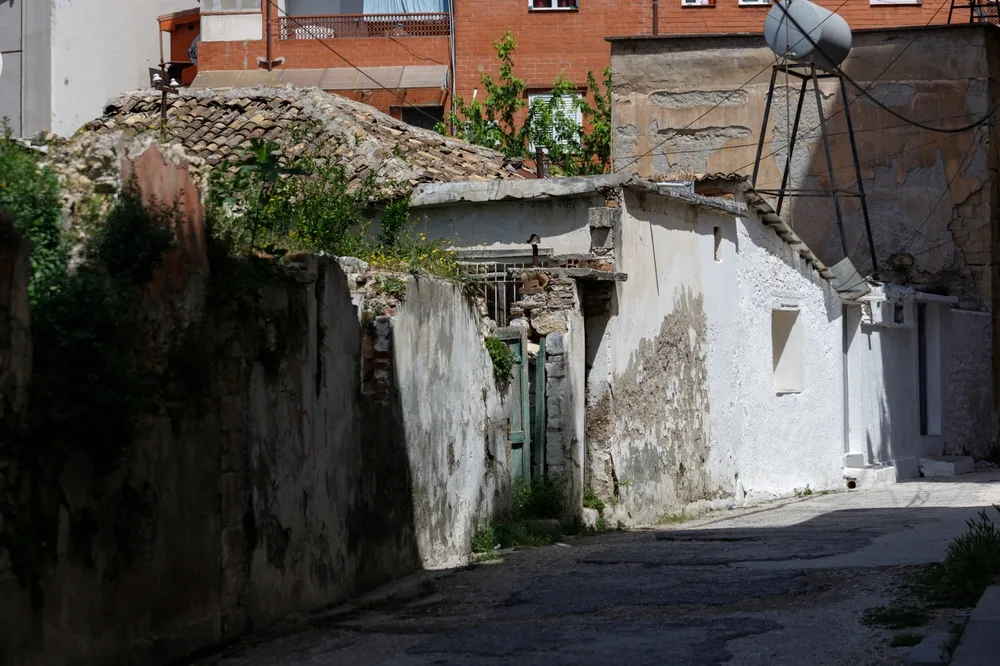
Yuliia Gornostaieva/Shutterstock
You should exercise increased caution in certain parts of Albania. The northern border with Kosovo is porous, and many organized criminal syndicates use the area for criminal activities.
Plus, there are potentially still landmines there. Avoid traveling in the border region alone or away from well-trafficked areas. Be careful in the southern town of Lazarat.
Although the situation has calmed down a lot in the past few years, this town used to be a hotbed for drug trafficking and criminal activity. Most Albanian cities have certain neighborhoods where you should be extra careful. In Tirana, try to avoid Rruga Ura, Paskuqan, and Babrru.
Frequently Asked Questions
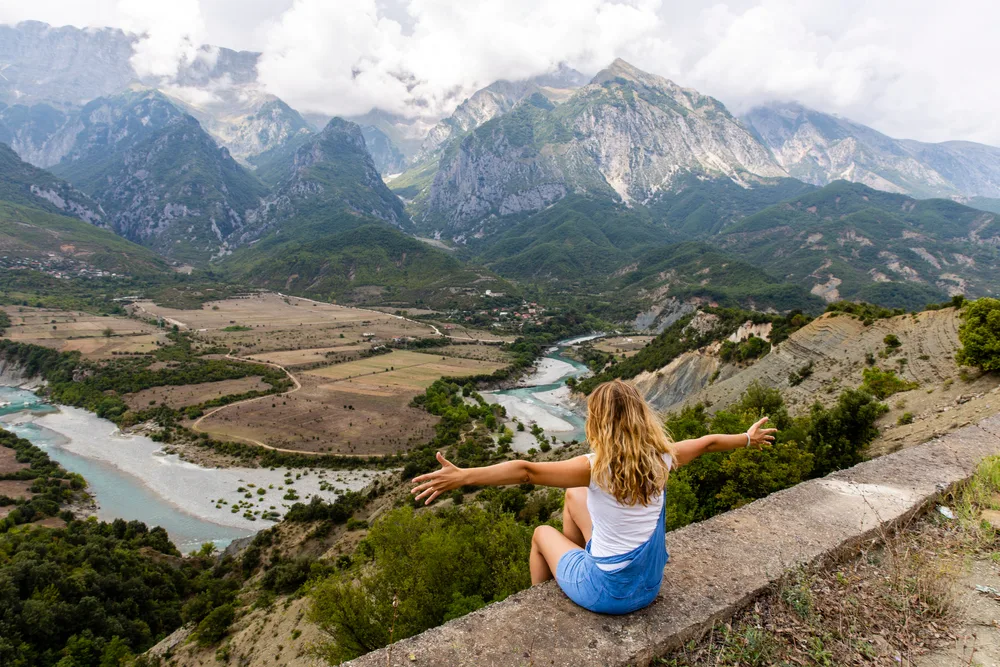
Michaela Komi/Shutterstock
Here are some common questions you might encounter while planning your trip to Albania:
Is it safe for tourists in Albania?
Most tourists to Albania have trouble-free visits. While you might encounter petty crimes such as pickpocketing, violent crime against tourists is very rare.
Why is Albania not a tourist destination?
Public perception of Albania is probably stopping the country from becoming an even bigger tourist destination. Most people think of Albania’s repressive communist period or tumultuous 1990s, with civil war, economic freefall, and high rates of organized crime, when they think of the country. Luckily, Albania has changed a lot since then.
Is it worth it to go to Albania?
Albania is absolutely worth visiting. The country boasts stunning landscapes from the mountains to the coast, rich history, and beautiful cities and towns.
Is Tirana safe for tourists?
Yes, Tirana is safe for tourists. Police tend to look out for foreigners and there is not a lot of violent crime. You just have to be careful of pickpockets, especially on public transportation.
Is Albania affordable or expensive?
Albania is a very affordable country to visit. The price of accommodation, food, and other items is very low. The affordability is a big reason why many young people are visiting Albania.
So, Should You Travel to Albania?
| 📈 Overall crime rate | 146 per 100k (low) |
| 👮♂️ Most common crime | Traffic violations |
| 🏠 Worst neighborhood | Lazarat |
| ❓ Safety tip | Don't travel alone or at night |
Once you look at the realities of travel to Albania, you realize that the country is quite safe to visit. As long as you take common sense precautions against pickpocketing, you should have a safe experience. Happy travels!



